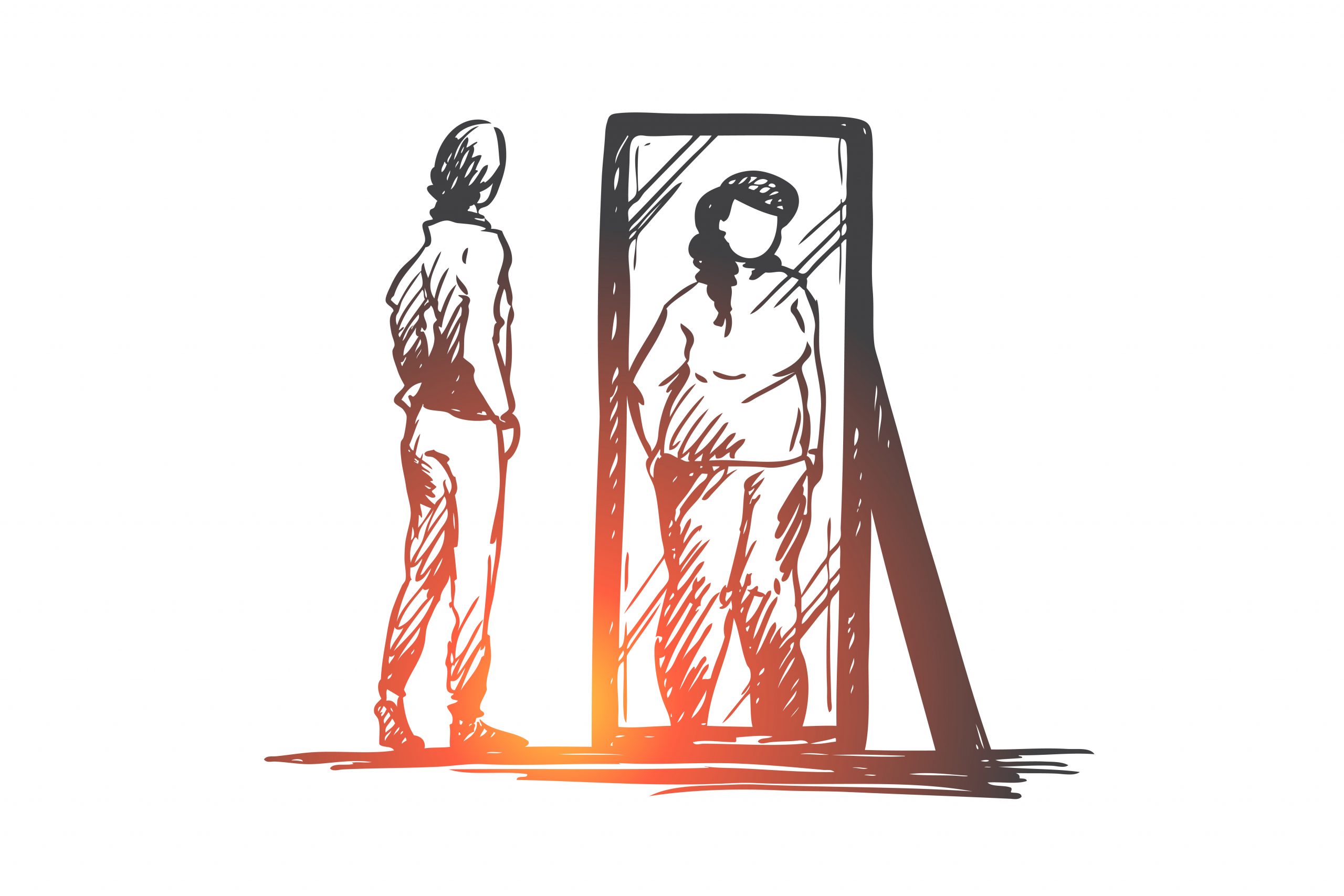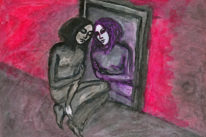
“You are not a mistake. You are not a problem to be solved. But you won’t discover this until you are willing to stop banging your head against the wall of shaming and caging and fearing yourself.” ~Geneen Roth
I’ve spent so much time on the dieting hamster wheel that I am almost too ashamed to admit it. Throughout my teen years I went from one crash diet to the next. When this proved more than unfruitful and disappointing, I changed strategies.
The next twelve years I spent searching for the “right lifestyle” for me, which would allow me to shrink to an acceptable size, be happy and healthy, and make peace with my body.
You can probably guess that I never found such a lifestyle. And I’m sure that it doesn’t exist for me. I’m still making peace with my body, but now I know this is internal work. No diet or size can bring me to this place.
How This All Began
I first became aware that I was fat when I was four. We had this kindergarten recital, and regrettably, my costume didn’t fit, so I was the only one with a different dress. It was horrible. It didn’t help that my mother was very disappointed in me.
Years later, I started dieting at the ripe age of ten.
In my teenage years my focus was mainly on losing as much weight as possible, as quickly as possible. It was exhilarating to get praise from my mother and grandmothers. They were so happy that I was taking charge of my weight and that I could show such restraint and will power.
I sometimes went months on almost nothing eaten. Eventually, I’d start to get dizzy and nauseous, and I’d get severe stomach aches. I was hospitalized multiple times for gastritis. But no one made the connection between my eating and these conditions.
When the pains were severe, I knew I needed to get back to eating more regularly, and then the weight would return. You wouldn’t believe the disappointment this elicited in the ones closest to me. If only I could eat like a normal person, but not be fat.
I was told hundreds upon hundreds of times that if I didn’t find a way to lose the weight, I’d be lonely, no one would like me, I’d have trouble finding a boyfriend, and I’d have almost no chance of getting married. This was so heartbreaking. And I believed every word of it.
It became a major focus of my life to get my body in order, so I could be a ‘real’ girl.
When I turned twenty, I learned that my weight was all my fault. That I wasn’t doing enough. That I just wanted results, without doing the work. And that “there’s no permanent result without permanent effort.” So, I decided to find the sustainable lifestyle change that would lead me to my thin and better self. This was just another wild goose chase.
No matter what I did, the pattern was the same: I would lose ten to thirty-five pounds in about six months. And then—even if I doubled my efforts in terms of eating less and training more—I would start gaining weight and return to close to where I started.
Even though it was soul crushing, I didn’t give up. Not even for a day.
I was convinced that I just didn’t know enough, or hadn’t found the right diet for me, the right exercise, or the right combination. Or that maybe I was just doing things wrong, for some reason.
I hired trainers, dieticians, the whole shebang. It didn’t help.
This lasted more than ten years and took a lot of money that could have been spent better.
I was convinced that I was missing something. Obviously, the professionals knew what they were doing, and there was something wrong with me.
How Things Got Even Worse
When I got married, even though my husband and I were planning to wait a couple of years before having children, the pressure to prepare for pregnancy was on.
I went into crazy researcher mode and read every book on the best diet for pregnancy and ensuring healthy offspring.
It was 2016 and keto was in (as it still is now). I was convinced that keto was the way to go.
This was a turning point for me. First, because I was so determined to succeed at this point, and second, because keto is one of the most restrictive diets in existence.
I became super obsessed, and for two years. I couldn’t see that things were going wrong. Very wrong.
There were both physical and psychological signs. I just didn’t have the mental capacity to notice them. And regrettably, there wasn’t anyone around to point out that something was amiss. My environment was, and still is to some extent, more conducive to disordered eating behavior than to recovery.
On the physical side:
- My nails were brittle.
- My hair was falling out.
- My heart rate was slow.
- I lost the ability to sweat, despite the vigorous exercise I did.
- I was often tired.
- I was getting dizzy a lot.
- I was shivering cold all the time.
On the psychological side:
- I was irritable.
- I felt I needed to deserve my food, so I exercised compulsively, at least two hours and up to five hours a day.
- I had forgotten how hunger feels. I was eating on a schedule, and that was that. Not feeling hunger was even reassuring.
- But despite the latter, when I got to the bakery or the supermarket, I felt intense cravings. My stomach was tight, but I would start salivating strongly. And I would think about food for the rest of the day, weighing the pros and cons of ice cream and my rights to a little pleasure and indulgence in life. My solution was to order just the ‘right’ food online and go out as little as possible.
- I started avoiding my friends and family and any outings with food. I couldn’t risk eating anything if it wasn’t prepared by me.
- On the other hand, I was keeping some sense of normalcy, while cooking normal food and desserts for my husband. I don’t know why, but the pleasure of cooking was somehow enough, and I didn’t get cravings from this.
- I was also obsessed with food and thinking about what to cook for myself and my husband, and what great things we had eaten, but I could never have again.
It was a torturous time. And even though my focus was on being my healthiest self, I had never been sicker in my life. I was suffering deeply.
How I Got Better
I can’t tell you I had a sudden realization about the errors of my ways. As I said, my whole environment supports the dieting mentality, and I had much more support in my dieting efforts than I do now in recovery. But still, I am managing.
I started seeing a therapist because I was lashing out at my husband, and I wanted to control my emotions better. By digging deeper into the issues underlying my anger I found a deep sense of inadequacy and not being enough. In the process of unravelling, I was able to make the connection that my problems with food stem from the same place, and I started working on them.
There are a few things that helped me most.
The first is meditation. Meditating has made a huge difference in my life because it’s enabled me to distance myself from my thoughts, and stop believing everything I think. This was huge.
It was important for me to observe this nasty, critical voice and to realize that it’s not mine. It sounded more like my mother. To distance myself from the voice and the emotionally charged image of my mother, I started seeing it like a mean, old witch. By associating a funny image with this chatter in my head, I was able to acknowledge it was there but go about my life, without engaging too much with it.
This has helped me treat myself much more kindly. And by being kinder to myself I started to accept myself more. I am human and not perfect. In some situations, I still start berating myself. But I catch myself quickly and don’t fall into the rabbit hole.
Second, I reached out for support from some trusted friends and started to go out more and observe other people. To my surprise, most people were not on the brink of death just because they ate pizza a couple times a month or because they enjoyed a drink or two.
Also, I started reading more books written by fat activists, and they have been of great help. They are full of humor, compassion, love, and understanding. They have helped me feel less alone, and I’ve benefitted immensely from their recommendation to normalize your view of your body by looking at images of other fat people.
For me, seeing other women of my size and finding them gorgeous and beautiful helped me accept myself more. Taking more pictures of myself, and getting used to how I look, was also huge for me. Because it’s very different from looking in the mirror. In the mirror you can look at just certain parts of your body and not pay attention to others. In a photo, you don’t have much choice.
This can be really hard at first. But it gets so much better.
Also, I found new ways to move my body and enjoy myself, and rekindled my passions for types of exercise I used to enjoy. This has made it so much easier for me to appreciate my wonderful body. I feel grateful for all I am able to do, every single day.
Choosing what to eat is still a battle sometimes. The disordered voices in my head are not abolished, as I said. But now, I can choose not to pay attention to them or believe them.
So now, when I am debating between pizza and fish with salad, I do a couple of things differently than before.
First, I ask myself what do I really want, and why. If I see that I am leaning toward the fish, but only because it’s “better for me,” I remember the sad person I was before. I remember how bad I felt when my life was ruled by rules. And then I clear the rules from my head and imagine what will taste better for me in this moment. And choose that option.
Of course, I don’t always eat pizza. I strive for balance and make healthy choices on the whole. The point is I don’t constantly deprive myself.
What helps me not fall into my old patterns is remembering the way I feel now. I know that despite being heavier, I haven’t felt happier and freer in my life. Not having that constant anxiety is my motivation.
It’s very hard, but I couldn’t be happier that I am going through this journey. I am connecting to myself, my body, and my wishes in a way I was never able to before. And I feel this is the most valuable experience.
I hope that if you’re battling with the same demons, you’ll win. I am rooting for you. And yes, it is possible.
About Vania Nikolova
Vania Nikolova, PhD, is the head of health research at RunRepeat.com. She uses her academic knowledge and experience with an eating disorder to shed light on why dieting is bad news.













 Though I run this site, it is not mine. It's ours. It's not about me. It's about us. Your stories and your wisdom are just as meaningful as mine.
Though I run this site, it is not mine. It's ours. It's not about me. It's about us. Your stories and your wisdom are just as meaningful as mine.
It is about “Eating healthy”. I never cared that I have a bit of fat on my tummy or my thighs, but I wanted to beat my mild depression that appeared from time to time. I also wanted more energy to do what I want in my daily life.
My solution as the author wrote was forcing myself to go to the gym, eat less junk food more vegetables through sheer willpower. That got me to lose focus at work and after breastfeeding I suffered from too much weight lost and got insomnia.
I have come to realize that no one can tell me how my body needs to be treated and I have started an internal journey to learn what my unique body really needs.
I am glad that you got there, it took me far too long. But I am oer the moon that I am at that place now. It’s very different, and in a good way.
This is not about eating healthy. This is about a person’s obsession with weight. The article was great but the title was extremely misleading.
I am glad you liked it, sorry for the confusion
The article hit my inbox the day I needed it. I have been struggling with body image even though I think and understand logically to accept myself and make changes because I want to and not because I am forced to fit in. I gained some weight over the last year, which was eventful. I have been very unkind to myself about that. Punishing my body by not eating. This article helps. Thank you.
I am so glad that it does! If you have trouble handling the holidays this could help as well https://www.angieviets.com/articles/how-to-escape-the-diet-talk-this-holiday-season
Great explanation of how family expectations and negative reinforcement can lead to eating disorders. I experienced the same. I’m so glad you are mostly past the unhealthy thinking. Good luck!
Thank you, Good luck to you too!
This is wonderful Vania, that you are finally making loving choices towards yourself and you have found a way to accept yourself.
Thank you for sharing your story.
Thank you for reading! I am glad that sharing my experience can be valuable to others.
Thank you for writing this. So brave of you to put your vulnerability on the page, it benefits others. I like your tip on photographs. Don’t you just love Geneen Roth? Her work has helped me so much as well.
Tinybuddha posts article right time on what I am going through. I am also going through same problem right now. Preparing for pregnancy doctors told me to lose weight. You by writing this gave me lots of courage
I am so glad it helps.
Thank you very much for sharing your story. It helped inspire me. My father said very similar things to me growing up. I just need to work with myself and love myself.